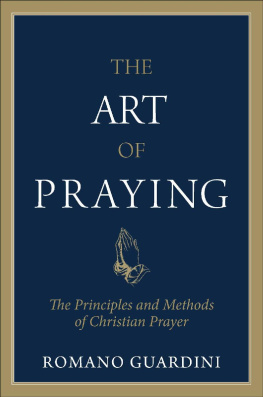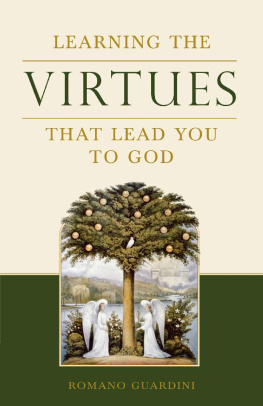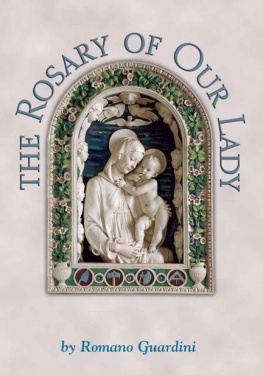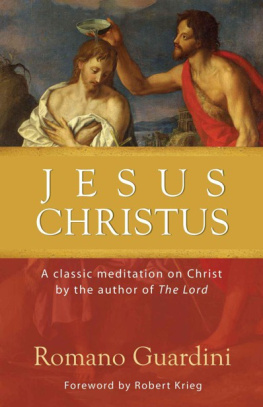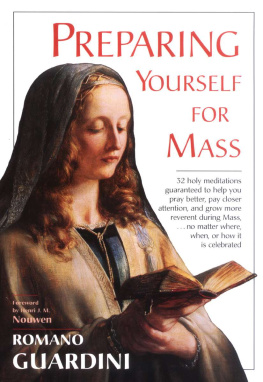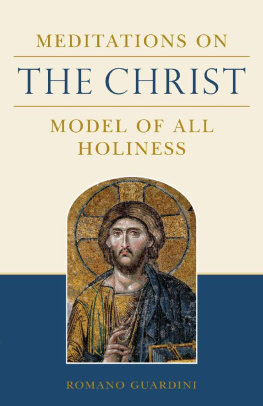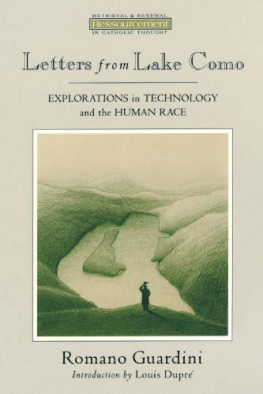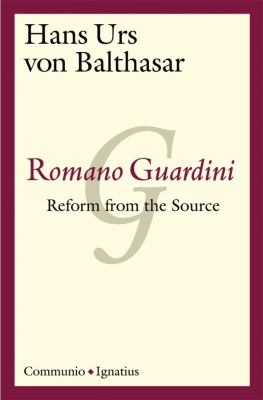Romano Guardini - The Art of Praying: The Principles and Methods of Christian Prayer
Here you can read online Romano Guardini - The Art of Praying: The Principles and Methods of Christian Prayer full text of the book (entire story) in english for free. Download pdf and epub, get meaning, cover and reviews about this ebook. year: 2014, publisher: Sophia Institute Press, genre: Science. Description of the work, (preface) as well as reviews are available. Best literature library LitArk.com created for fans of good reading and offers a wide selection of genres:
Romance novel
Science fiction
Adventure
Detective
Science
History
Home and family
Prose
Art
Politics
Computer
Non-fiction
Religion
Business
Children
Humor
Choose a favorite category and find really read worthwhile books. Enjoy immersion in the world of imagination, feel the emotions of the characters or learn something new for yourself, make an fascinating discovery.
- Book:The Art of Praying: The Principles and Methods of Christian Prayer
- Author:
- Publisher:Sophia Institute Press
- Genre:
- Year:2014
- Rating:5 / 5
- Favourites:Add to favourites
- Your mark:
- 100
- 1
- 2
- 3
- 4
- 5
The Art of Praying: The Principles and Methods of Christian Prayer: summary, description and annotation
We offer to read an annotation, description, summary or preface (depends on what the author of the book "The Art of Praying: The Principles and Methods of Christian Prayer" wrote himself). If you haven't found the necessary information about the book — write in the comments, we will try to find it.
The Art of Praying: The Principles and Methods of Christian Prayer — read online for free the complete book (whole text) full work
Below is the text of the book, divided by pages. System saving the place of the last page read, allows you to conveniently read the book "The Art of Praying: The Principles and Methods of Christian Prayer" online for free, without having to search again every time where you left off. Put a bookmark, and you can go to the page where you finished reading at any time.
Font size:
Interval:
Bookmark:
The Art of Praying
The Principles and Methods of Christian Prayer
Formerly entitled
Prayer in Practice
Romano Guardini
SOPHIA INSTITUTE PRESS
Manchester, New Hampshire
The Art of Praying was originally published as Vorschule des Betens by Matthias-Grnewald Verlag, Mainz, Germany. Pantheon Books published this English translation by Prince Leopold of Loewenstein-Wertheim in 1957 as Prayer in Practice . This Sophia Institute Press edition is published by arrangement with Pantheon Books, a Division of Random House, Inc.
Copyright 1957, 1985 Pantheon Books,
A Division of Random House, Inc.
Printed in the United States of America
All rights reserved
Jacket design by Lorraine Bilodeau
Cover photograph courtesy of SuperStock Incorporated
No part of this book may be reproduced, stored in a retrieval system, or transmitted in any form, or by any means, electronic, mechanical, photocopying, or otherwise, without the prior written permission of the publisher, except by a reviewer, who may quote brief passages in a review.
Sophia Institute Press
Box 5284, Manchester, NH 03108
1-800-888-9344
www.SophiaInstitute.com
Nihil obstat: Joannes M. T. Barton, S.T.D., L.S.S., Censor Deputatus
Imprimatur : E. Morrogh Bernard, Vicar General, Westmonasterii
February 20, 1957
Library of Congress Cataloging-in-Publication Data
Guardini, Romano, 1885-1968[Vorschule des Betens. English]
The art of praying : the principles and methods of Christian prayer : formerly entitled Prayer in practice / Romano Guardini.
p. cm.
English translation originally published: New York, N.Y. : Pantheon, c1957.Includes bibliographical references.
ISBN 0-918477-21-2 hdbk
ISBN 0-918477-34-4 pbk1. PrayerChristianity. I. Title.
BV210.G8213 1994
248.3'2dc2094-6426 CIP
Other books from Sophia Institute Press by Romano Guardini:
Eternal Life
The Inner Life of Jesus
The Rosary of Our Lady
And the Word Dwelt Among Us
Learning the Virtues That Lead You to God
Preparing Yourself for Mass
Living the Drama of Faith
The Lord's Prayer
The Living God
Preparation and Form
________________
The life and practice of prayer
It is often asserted that true prayer cannot be willed or ordered, but must flow spontaneously, like water from the spring, from within. If this does not happen, if it does not well up from our innermost being, one had better not pray at all, for forced prayer is untrue and unnatural.
This sounds, at first, convincing; however, if one has gained a fuller understanding of man's nature and religious life, one cannot wholly dismiss the suspicion that those who propound such views have never seriously concerned themselves with prayer. Undoubtedly, there is prayer which comes unprompted from within. For instance, some unexpected glad tidings may move a man to give thanks and praise to God; or, when in great distress, he may turn to Him whose love he does not doubt and who has the power to comfort and to help. There are times also when man experiences God's presence so vividly that he speaks to Him spontaneously. Or he suddenly becomes aware of the work of divine government behind some event and stands still, overawed.
The fact that these things do happen does not mean that they must inevitably happen. Life and destiny may stand like an impenetrable wall between man and God. The feeling of the holy presence may disappear so completely that man may think he has never experienced it. Happiness may cause him never to think of God, or affliction may shut off the inner vision. The dictum sorrow teaches people to pray is only half true, for it is equally true that adversity turns people away from prayer.
Prayer which springs from inner longing must, on the whole, be considered as the exception. Anyone proposing to build his religious life on this foundation would most probably give up prayer altogether. He would be like a person trying to base his life entirely on intuition and impressions, leaving aside order, discipline, and work. Such a life would be at the mercy of chance; it would become self-indulgent, arbitrary, fanciful; earnestness and steadfastness would vanish. The same would happen to prayer that relied exclusively on inner spontaneity. Anyone who takes his relationship to God seriously soon sees that prayer is not merely an expression of the inner life which will prevail on its own, but is also a service to be performed in faith and obedience. Thus it must be willed and practiced.
Establishing a regular schedule for prayer
It is of this practice of prayer that we shall speak here. Above all, it consists in saying one's prayers at certain fixed hours: in the morning before starting the tasks of the day and in the evening before retiring. In addition everyone should do what he thinks right, what he is able to do, and what suits his routine: perhaps grace before and after meals, the Angelus, a short collect before work, or a quiet moment in a church. An essential condition for this practice is to adopt the right attitude, both outwardly and inwardly: recollectedness at the beginning and discipline during prayer are essential, as is the right choice of words and texts, the learning of old, established forms of prayer such as contemplation, the Rosary, and others.
Self-deception about prayer
No hard-and-fast rules can be laid down for this; we shall discuss it more fully later. But whatever routine one may adopt, one should carry it out honestly and conscientiously. In matters of prayer we are only too apt to deceive ourselves because, generally speaking, man does not enjoy praying. He easily experiences boredom, embarrassment, unwillingness, or even hostility. Everything else appears to him more attractive and more important. He persuades himself that he has not got the time, that there are other more urgent things to do; but no sooner has he given up prayer than he applies himself to the most trivial tasks. We should stop lying to God. Better to say openly, I do not wish to pray, than to make such excuses. Better not to resort to specious justifications such as, for instance, tiredness, but to declare, I do not feel like praying. This may sound less decorous, but at least it is the truth which leaves the way open, whereas self-deception does not.
Prayer is essential to faith
But it is as well that we should remind ourselves that this is an important and serious matter. We should not be self-indulgent; we should do what duty and necessity require of us, and if it prove hard we should not hesitate to be a little stern with ourselves. Without prayer, faith becomes weak and the religious life atrophies. One cannot, in the long run, remain a Christian without praying, as one cannot live without breathing.
But is this really so? Is prayer really necessary? Or is it only for inactive, impractical, somewhat weak people who do not properly fit into life? Might one not even say on the basis of certain observations that there is something unnatural and musty about the world of praying people, something which repels the feeling of that which is vigorous and life-affirming? We shall examine later whether there is any truth in this assertion. Here we are merely discussing the fundamental question of whether prayer is a compelling necessity for the conduct of a true Christian life.
Prayer is essential to health
We may go further and ask whether it is not also a necessity from the point of view of ordinary health and well-being. There have been many noteworthy pronouncements to the effect that man runs a serious risk if his life is completely devoid of any activity which corresponds or is akin to prayer. Medical authorities point out that people whose attitude is exclusively extrovert, who are carried from one sensation to another, whose thoughts, conversation, work, struggles, and desires are mainly directed toward external goals, soon reach a state of exhaustion and confusion.
Next pageFont size:
Interval:
Bookmark:
Similar books «The Art of Praying: The Principles and Methods of Christian Prayer»
Look at similar books to The Art of Praying: The Principles and Methods of Christian Prayer. We have selected literature similar in name and meaning in the hope of providing readers with more options to find new, interesting, not yet read works.
Discussion, reviews of the book The Art of Praying: The Principles and Methods of Christian Prayer and just readers' own opinions. Leave your comments, write what you think about the work, its meaning or the main characters. Specify what exactly you liked and what you didn't like, and why you think so.

